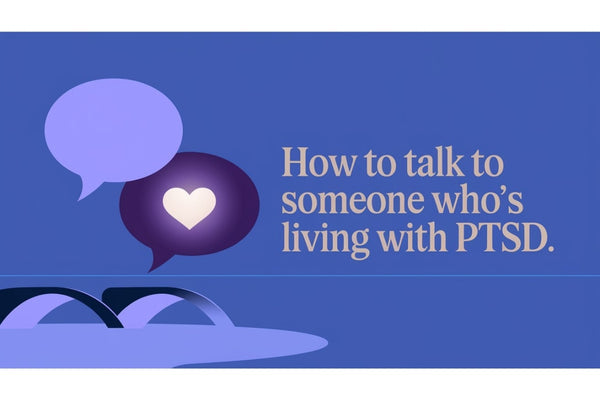
How to Talk to Someone Who’s Living with PTSD
Share
How to Talk to Someone Who’s Living with PTSD
Living with Post-Traumatic Stress Disorder (PTSD) can be isolating, and understanding how to communicate with someone who has PTSD can make a world of difference. Whether you’re a friend, family member, or partner, supporting someone through their journey of healing requires patience, empathy, and a genuine desire to help. In this blog, we’ll walk through effective ways to talk to someone with PTSD and tips for fostering a compassionate, open environment.
1. Be Sensitive to Their Triggers
PTSD is often rooted in trauma, and certain conversations, locations, or even words can trigger intense emotional responses. It’s important to approach sensitive topics gently and with awareness. Avoid pushing them into situations where they feel unsafe or uncomfortable.
- Tip: Ask if there are any specific triggers you should be aware of before having a discussion.
- Example: "Is there anything I should avoid talking about or doing that might make you feel uneasy?"
2. Create a Safe, Calm Space for Conversation
For someone with PTSD, feeling safe is essential to their well-being. When you want to talk, choose a quiet, private setting where the individual feels relaxed. Avoid distractions, and make sure they know they can leave the conversation at any time if it becomes overwhelming.
- Tip: Set the tone by being patient and not rushing the conversation.
- Example: "I want to make sure you feel comfortable. Let me know if you ever need a break."
3. Be an Active Listener
The most important part of supporting someone with PTSD is listening without judgment. Sometimes, they may need to express their feelings without offering advice or solutions. Let them speak freely and validate their emotions by showing you understand and care.
- Tip: Use phrases like "I’m here for you" or "I can’t imagine how hard that must be."
- Example: "It sounds like that was really tough for you. I’m here to listen whenever you want to talk."
4. Avoid Minimizing Their Experience
PTSD is a serious mental health condition, and it’s important not to invalidate the individual’s feelings or experiences. Avoid saying things like “Just get over it” or “You’ll be fine, it wasn’t that bad.” These types of statements can make someone feel isolated and misunderstood.
- Tip: Instead of minimizing, offer support and empathy.
- Example: "I can’t fully understand what you’re going through, but I’m here to support you every step of the way."
5. Offer Encouragement, But Don’t Push Too Hard
While encouragement is helpful, it’s important to avoid pressuring someone to talk or "move on" from their trauma. Everyone heals at their own pace. Let them decide when they’re ready to engage in conversations about their PTSD, and offer support when they do.
- Tip: Let them know you're available, but give them the space to reach out on their own.
- Example: "Whenever you feel ready to talk or need support, I’m here for you."
6. Understand Non-Verbal Communication
Sometimes, those living with PTSD may not be able to verbally express their feelings or needs. They might show their discomfort or anxiety through body language, facial expressions, or other non-verbal cues. Being able to read these signs and respond with care can go a long way in showing your support.
- Tip: If you sense distress, ask if they’re okay and offer a comforting gesture, like a hug (if they’re open to it).
- Example: "I noticed you seem a bit tense. Do you want to talk about what’s on your mind?"
7. Respect Their Boundaries
People with PTSD often have boundaries that help them manage their emotional well-being. It’s important to respect these limits, even if they may feel difficult to understand. If someone asks for space, give them that space. Don’t force them to engage when they’re not ready.
- Tip: Offer choices in how you communicate or interact.
- Example: "I understand if you don’t want to talk right now. Would you like to hang out in another way, maybe just watch a movie together?"
8. Be Patient and Consistent
Building trust takes time, especially for someone dealing with PTSD. Your patience and consistency will show them that you are a reliable, steady source of support. Sometimes, it may feel like progress is slow, but your continued presence makes a huge difference in their healing journey.
- Tip: Keep your commitments and show up when you say you will.
- Example: "I’m here for the long haul, no matter how long it takes."
9. Seek Professional Guidance Together
If the person you're supporting is open to it, suggest seeking professional help. Therapy and counseling are essential for healing from trauma. Offer to help find resources or support them in finding a therapist or support group.
- Tip: Encourage the idea gently and without pressure.
- Example: "I know that talking to a professional can really help. Would you like me to help find someone for you?"
In Conclusion
Supporting someone with PTSD requires empathy, patience, and understanding. By creating a safe space for communication, being an active listener, and respecting boundaries, you can be a powerful ally in their journey toward healing. Remember, your support can make all the difference in their recovery process.
If you or someone you love is living with PTSD, it's important to seek the necessary resources and professional help. Recovery is possible, and with the right support, it becomes more achievable every day.
